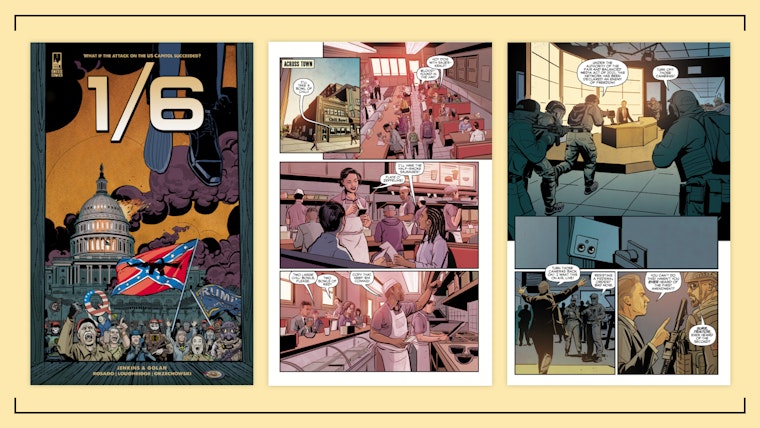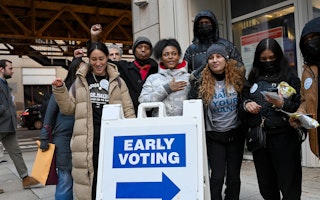Reimagining January 6th
By Alan Jenkins

I confess I am a lifelong comics geek. Growing up, I was a big fan of Sub-Mariner, who recently arrived in the Marvel Cinematic Universe. He was saving the world from beneath the waves while calling out the “surface dwellers” for their mistreatment of the oceans and his people. I loved the Black Panther, and Daredevil, a blind attorney by day who turned into a superhero by night.
A big part of what drew me to these titles—and what connects my love of comics to my career—is the long history in the genre of promoting democracy and battling authoritarianism. Captain America debuted in 1941. On the cover of the very first issue, he’s shown socking Adolph Hitler in the jaw—months before the U.S. entered World War II. Black Panther fought the Klan. Superman fought for truth and justice. The award-winning Maus takes on the Holocaust.
I thought about that history in the weeks and months following the January 6th insurrection in 2021. I found myself waking up at 4:00 a.m. in a cold sweat, worrying about the looming threats: the authoritarianism, antisemitism, and white supremacy that helped drive people to extremes that fateful day, and the lack of accountability for the many officeholders who spread lies about the 2020 election and cheered the rioters on.
I teach at Harvard Law School today, but for most of my life, I’ve been an advocate. So I spent those sleepless nights reflecting on what I could contribute in the face of the threats—threats which continue to this day. Creating a comic book seemed like one way to sound the alarm, reach people who might not be obsessively following the news, and spark some activism to help preserve and defend our multicultural democracy.
I reached out to Gan Golan, an award-winning graphic novelist, and we recruited help from some comic industry veterans, including our main illustrator, Will Rosado. We launched a Kickstarter, partnered with Western States Center and, with the support of the Open Society Foundations and other funders, we were off to the races. On the second anniversary of the insurrection, we released 1/6, the first of what will be a multivolume series of comic books that relate the origin story of the assault on the U.S. Capitol and imagine an alternative history in which the insurrection succeeded.
We drew our inspiration from the social justice themes of our favorite comics, and the ways other works of art have used speculative fiction as a way of moving readers to engage on something they might not want to talk about: George Orwell’s 1984; Margaret Atwood’s A Handmaid’s Tale; Rod Serling’s Twilight Zone. Our focus was on reaching people who love comics and pop culture, and might be persuadable on issues of authoritarianism, equality, dignity and the harms of bigotry, but who might be disengaged from the public discourse, or didn’t have time to read the January 6th Committee report.
And we wanted to give people motivated by the book a roadmap for action. So we worked with our partners at the Western States Center to produce an Education and Action Guide which offers resources and ideas to educate and catalyze civic engagement, while encouraging readers to come up with ideas of their own.
It’s too early to say what impact the book is having; we just released the print version on May 6—free comic book day. But we’ve received some great media attention, gotten great reviews from critics and fans, and we’ve given away thousands of copies to pro-democracy organizations, anti-bigotry groups, colleges and universities, and nonprofit bookstores. We’re taking it to Netroots Nation, but also hitting Comicon in San Diego, New York, and Washington, D.C. And we’ve sent it to libraries in places that have banned books, and to many members of Congress in both parties—including all the 2020 election deniers still serving today.
Art has the power to spark activism. We’ve seen it before; in the aftermath of the McCarthy era, storytelling about the dangers of that time flourished, from Arthur Miller’s essential play, The Crucible, to The Manchurian Candidate, to Rod Serling’s Planet of the Apes and Twilight Zone episodes. We saw a surge in artistic activism in response to the previous administration—including in the world of comic books, from the established houses like Marvel and DC as well as among independents. A lot of it was sparked, as well, with the murder of George Floyd.
But the energy has dissipated somewhat since then. And that’s worrisome. We see the authoritarian element reaching into those spaces in ways that can put democracy in peril. You see it in cultural corners of the internet, where white supremacist elements enter a conversation about, say, Wonder Woman, or The Little Mermaid, and try to indoctrinate and recruit young people.
I hope our graphic novel can be a counterweight to those efforts. It’s vital that pro-democracy voices stay active—and are present in pop culture spaces. And the beauty of comic books is that you grew up with them as a powerful form of storytelling whether you’re 8 or 80. We hope it’s a way of engaging and persuading undecided readers and empowering those who already agree with democratic values.
We can’t afford to retreat from the fight. There’s a narrative out there that because we came up to the brink of losing our democracy during the insurrection, we’ve dodged a bullet, and we can relax again. But there are 10 more bullets in the chamber, aimed at the heart of our democracy.
Alan Jenkins is a professor at Harvard Law School and co-author of the graphic novel 1/6, created with support from the Open Society Foundations.


